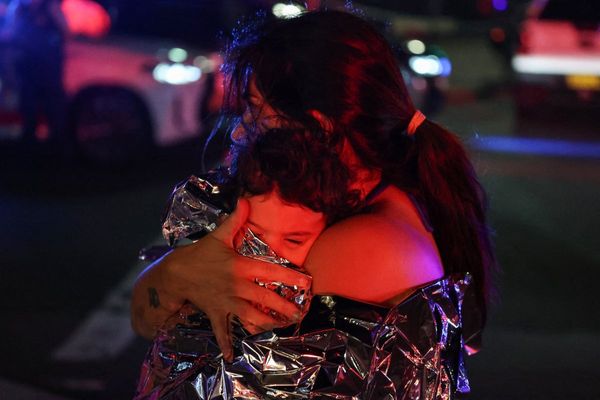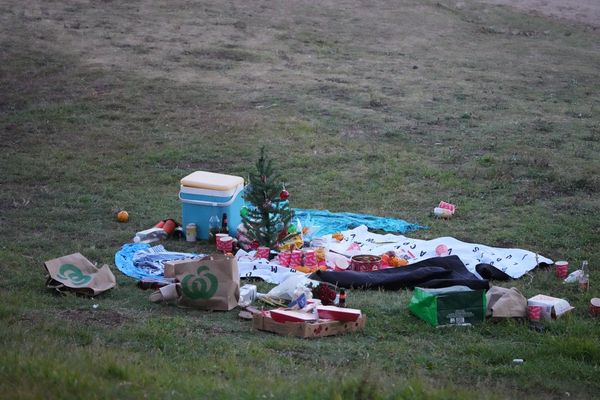Aeronautical engineer Lauren Burns found out her dad was not her biological father when she was 21.
She was stunned by the revelation that the world she inhabited was not as she'd assumed.
"It was like a like a splinter in my brain, just of all these questions unanswered and nothing to fill in the gaps," she says.
It took Dr Burns five years to track down the identity of the man who'd helped make her in the mid-80s with promises of anonymity. And what she found surprised her even more.
The biological father was the youngest child of famous Australian historian Manning Clark. Both Benedict Clark, a GP in rural Victoria, and his extended family were happy to meet her.
Seven years later, they still have a meaningful connection.
But Dr Burns isn't done.
"I was able to solve the pieces of the puzzle for myself but it's not fair that just I get to do this and others don't," the now 37-year-old says.
"We should all have that right."
After successfully lobbying the Victorian government to introduce world-first retrospective legislation in 2015 so that all donor-conceived people had the right to know their donor irrespective of anonymity promises made in the past, Dr Burns is now trying to get the whole country on board.
She and other donor-conceived people want a national apology to all those who have been denied information when they sought it. And they want a national approach to the regulation of sperm and eggs used in artificial reproductive treatment.
This comes as the Victorian government has amended the legislation to accommodate the increased demand for sperm and eggs to enable more children to be born from any given donor and to allow the gametes of deceased donors to be used.
The man charged with reviewing Victoria's IVF industry says donor shortages and increasing costs have driven would-be parents and private clinics offshore.
"We have seen a shift in recent years to more overseas gametes coming into the country for donor-conceived children," lawyer Michael Gorton says.
"Records may not be maintained as well as they would be maintained here in Victoria and the ability to have a relationship with your donor is substantially limited, I think, as a consequence.
"So our preference must be to source donor sperm and donor eggs in Victoria to enable local connection."
But Mr Gorton ruled out banning the practice of using imported donations.
"If we limited donor conception in Victoria, there would be a massive outcry. There would be couples unable to have children," he says.
"And some donor-conceived children are comfortable in themselves and glad that they came into existence."
That's enraged many of those who have struggled to know where they came from.
"We often get thrown the, 'Why don't you just be thankful you are alive?' trope," Dr Burns says. "And to that, I say that it doesn't really make sense.
"If you take another case, such as someone conceived from a rape, obviously we don't expect them to endorse their method of conception, even if they are happy and thankful to be alive."
'It's not a human right to have children'
A quiet battle is brewing between people wanting donated eggs and sperm and those, like high school teacher Ross Hunter.
Conceived in 1976, at a time when donor anonymity was considered sacrosanct, Mr Hunter only learnt he was donor-conceived when he was 33.
As soon as the now 44-year-old started asking questions, he hit a series of brick walls.
It was only when the retrospective legislation was enacted eight years later that Mr Hunter finally learnt his donor's name.
The man did not want to meet with him, but Mr Hunter treasures the information his donor sent him.
"I found out his profession and his ethnicity — both of those things were important things that I wanted to discover, especially just in light of some of my unusual spread of talents and interests."
Now he feels like politicians are turning a blind eye to the pain that secrecy caused him for so many years.
"We feel like once again, we're on the backburner of considerations," Mr Hunter says.
"It's privileging this kind of consumer position of parents that valorises the idea that barriers need to come down for these heroic parents.
"But it's not a human right to have children."
Fellow donor-conceived advocate Hayley Smith-Williams, 31, agrees.
"I've been incredibly fortunate that the contact that I've been able to make with my biological father has been really positive," she says.
"But I still can't find all my donor half-siblings."
Ms Smith-Williams fears the increased number of children from each donor could have deep scars into the future for families.
"That deep sense of injustice can really ripple through families," she says.
"It doesn't just end with a donor-conceived person and their story but it impacts the family going forward as well.
"My child has the same right to know his mum's heritage."
'Think about the interests of the child'
Dr Burns has issued a warning that the new amendments to the legislation could mean Victoria is repeating the mistakes of the past.
"The next generation will also be without meaningful connection to their biological family," she says.
"And it's really frustrating because I feel a sense of responsibility that we know enough now to prevent this, that it shouldn't have to happen again."
Mr Gorton's solution is for a public IVF system with a donor egg and sperm bank included, to encourage local Victorian donors. He says it means donor-conceived people will have the potential for meaningful connection with their donor.
Mr Gorton agrees with Dr Burns that a national apology for the wrongs done to donor- conceived people in the past is needed.
"There were some things done that [were] highly inappropriate and it has clearly damaged some children as a consequence," he says.
Dr Burns now has a child of her own — six-month-old Murray. The experience has only hardened her resolve.
"It did help me empathise with people who want that and with all of the anger and frustration that must accompany infertility, so I do kind of get that in a more visceral way," Dr Burns says.
"But at the same time, I feel like when you become a parent, it's not just about what makes you the most comfortable in your decision-making, but you have to sometimes think about what's in the interests of your child as well."
"When I see Murray, it reinforces the importance that I know where I come from, so she can know where she comes from as well."
Watch Australian Story's In the Name of the Child on iview and Youtube.







